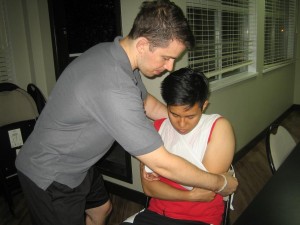Overview
The shoulder joint is more prone to injury than any other joint in the body because it has such a large range of motion. These injuries can be caused by problems with the joint itself or some of the structures that surround the joint.
The following conditions are common causes of a painful shoulder and they can also limit the amount of movement that you have in your shoulder.

Disorders Of The Rotator Cuff
The shoulder joint is held in place by the rotator cuff, which is a group of tendons and muscles. It also helps to move the shoulder. Disorders to the rotator cuff usually occur because the muscles and tendons of the cuff become inflamed. There are a number of causes of this such as general wear and tear and repetitive shoulder motion.
Frozen Shoulder
It is not known exactly what causes a frozen shoulder, but some people experience this after they have had some other type of shoulder injury. People that have a frozen shoulder will feel pain and stiffness that gets progressively worse. It can be difficult for people that suffer from this condition to move the shoulder at all when the pain is too bad as it is felt deep within the joint.
Dislocated Shoulder
The humerus bone in your arm connects to your shoulder through a ball shaped joint that fits into your shoulder socket. If this bone comes out of the socket then your shoulder is said to be dislocated and this is an extremely painful condition. You will be able to see immediately if your shoulder is dislocated because it will be very obvious that it is out of place.
Arthritis
There are two forms of arthritis, rheumatoid arthritis and osteoarthritis, and both of these can affect the shoulder joint. This condition can cause swelling and stiffness in the shoulder joint which can lead to it becoming tender. The pain that you experience may get progressively worse if you suffer from arthritis.
Treatment
Most forms of treatment for shoulder pain focus on restoring some of the mobility to the joint of your shoulder as well as relieving the pain. Different causes of shoulder pain will require different treatments.
The initial treatment for shoulder pain is usually some form of pain relief such as taking paracetamol and NSAIDs (non-steroidal anti-inflammatory drugs). A cold pack can also be applied to your shoulder if you would rather not take pills. These can also help to reduce the inflammation and are most effective when they are applied during the first few days after an injury has occurred. After this time a heat pack should be used as this can help to relax the muscles in the shoulder.
It is important that the shoulder does not begin to seize up and so you should keep it moving as far as you able depending on the amount of pain that you feel.